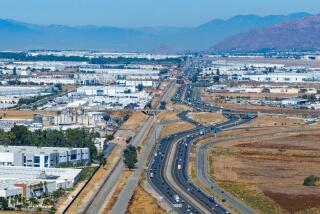It’s Just Another Shot at the Jackpot
- Share via
For years, city officials in Garden Grove have been dreaming up big ways to boost finances in a town that ranks nearly last in tax revenue among Orange County’s 34 cities.
All of the ideas have been built around the city’s biggest asset: a redevelopment area along Harbor Boulevard, just blocks from Disneyland, that positions Garden Grove to cash in on one of California’s biggest tourist markets.
Once it was a plan to build a replica of London Bridge across a faux river. That later became Music City Riverwalk, a music-themed entertainment complex. Some Middle Eastern investors once proposed an Oasis of Peace, a museum and cultural center dedicated to the late King Hussein of Jordan.
The ideas all failed -- some for lack of money, some because city leaders and residents couldn’t agree on what to do.
The latest plan -- a Las Vegas-style mega-resort potentially backed by casino mogul Steve Wynn -- attracted widespread criticism this week only hours after it became public. Even some City Council members in on the preliminary discussions were opposed.
“I just don’t think we need to sell out the interests of Garden Grove for the big score,” said Councilman Mark Leyes. “I don’t think we’re that desperate.”
The scenario is familiar to former City Manager George Tindall, who retired this year.
“That’s what happens to Garden Grove: one disaster after another,” he said. “No one wants change.”
Change, Tindall said, was necessary if the city wanted to survive as the state continues to siphon money from local and county government. Amenities that residents expect -- such as parks and public safety -- don’t come free.
While some neighboring cities, such as Anaheim, have prospered, Garden Grove has struggled. In 14 of the 16 years Tindall managed the city, services were cut, he said. Since 1972, despite a population growth of nearly 50,000, the Police Department has not added officers.
Without new revenue, the city may soon be forced to introduce a utility tax or contract out police and fire services to save money, he said.
“The state of California has forced cities into looking into things like this,” Tindall said. “You’ve got to be innovative. You can’t bury your head in the sand.”
Public policy experts agreed, blaming a local and state public finance system that restricts property tax revenue through Proposition 13. That and funding shifts by the Legislature have made cities increasingly dependent on sales and hotel taxes, so they need commercial development to survive.
“Given how restricted local governments are in getting needed revenue, cities are trying their best to act rationally, responding to a very irrational system,” said Scott Bollens, professor of planning, policy and design at UC Irvine.
For Garden Grove, the plan has always been about taking advantage of Harbor Boulevard and the city’s proximity to Disneyland. Over the last six years, the city has helped developers build 2,000 hotel rooms and several restaurants.
City leaders are also promoting International West, a 400-acre entertainment and retail zone modeled after International Drive in Orlando.
The centerpiece would be another amusement park to lure tourists to stay extra days after visiting Disneyland and California Adventure.
The plan was scaled back, however, after hundreds of angry residents packed City Council meetings to complain that the project would have potentially pushed nearly 1,000 families from their homes.
Resident Steve Raganold, chairman of the Central Garden Grove Neighborhood Assn., complained that there hadn’t been enough opportunity for public comment or an organized, multi-agency effort to re-envision the area.
“What I’ve seen here is a parochial effort, essentially a turf battle,” Raganold said.
“I think it’d be a lot better to have a regional vision rather than a Garden Grove vision.”
As for what he’d like to see in the city, Raganold doesn’t know either. “I’m not being evasive,” he said, “but I’m not a Harvard-graduate community planner.”
Raganold’s attitude is shared by many residents who can’t say exactly what the city needs but know what they dislike when they see it.
“It’s important to generate money if they don’t have funds to improve the city,” said Heather Strom, manager of Mile High Comics, a business across the street from where a casino project might be built.
“But I don’t like the casino idea. I don’t think this place is set up for a Vegas-style atmosphere. And I wouldn’t want to live in Las Vegas.”
Councilman Leyes, though also opposed to the casino, said residents should not rule out any new development. He points out that though many were skeptical about the deals the city cut with developers to build hotels in recent years, those ventures are proving profitable to the city.
Some residents were angry that they learned of the casino talks only after they were disclosed by Orange County Supervisor Chris Norby on Tuesday at a county board meeting, but not all objected to the plan.
Some were intrigued by the idea of a resort developed by the man who helped build the Mirage, Bellagio and Treasure Island.
“It should be developed,” said sushi chef Joe Lee, owner of Tokyo Love restaurant on Harbor Boulevard. “It would be good business.”
Added Leo Castro, manager of the Travel Country RV Park adjacent to the proposed casino site:
“I’m sure there’ll be a lot of traffic and construction going on,” he said. “But I think it’ll bring in tons of jobs and tourism. If it helps the city, why not?”
More to Read
Sign up for Essential California
The most important California stories and recommendations in your inbox every morning.
You may occasionally receive promotional content from the Los Angeles Times.














